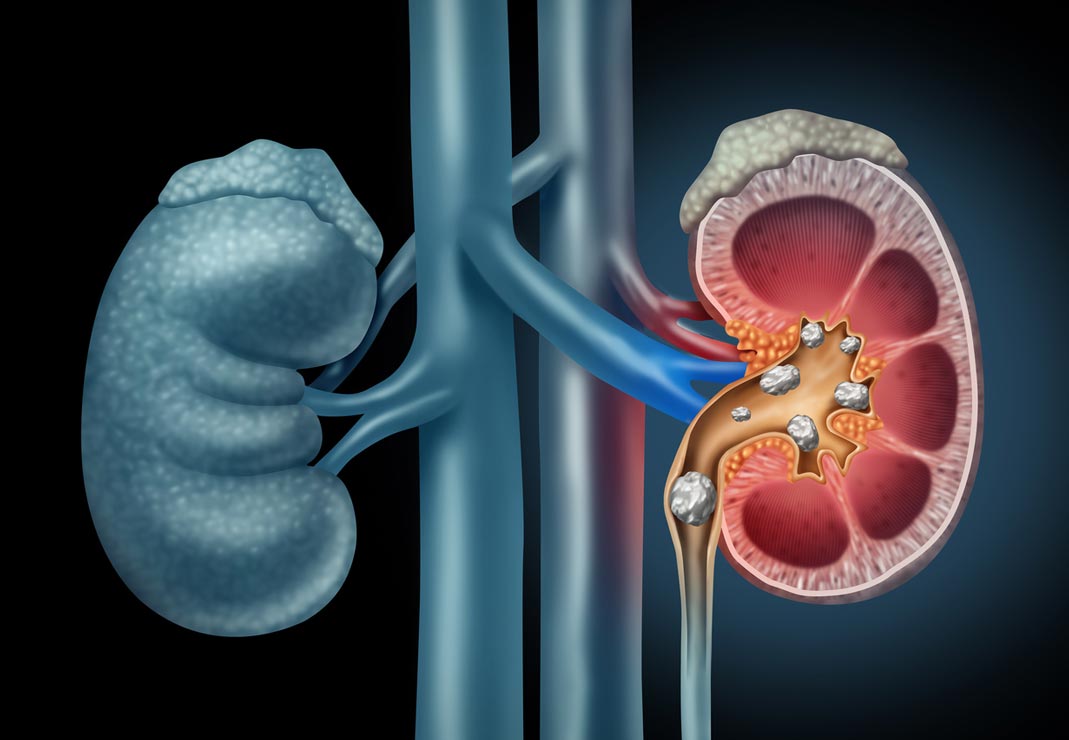Should People Prone to Kidney Stones Use Turmeric?

Kidney stones are a common condition affecting 20% of people worldwide. The majority of kidney stones are mostly made of oxalate compounds. About a fifth of people who develop kidney stones have too much oxalate in their urine. This is a condition called hyperoxaluria, and it contributes to the increased risk these people have for the painful calcifications. Passing kidney stones through the urinary tract can be extremely painful. Moreover, the tissue damage caused by chronic stones can eventually lead to kidney failure. (i.81, 82)
Oxalate Content of Turmeric
Medical experts suggest that turmeric supplementation could cause health problems for people with a tendency to form kidney stones. This is because turmeric contains high levels of oxalate and significantly increases the level of oxalates in urine. (i.67)
Higher than normal urine oxalate levels can significantly increase the risk of forming kidney stones. The 2005 American Dietetic Association (ADA) suggests that eating foods high in oxalate will contribute to that risk. ADA guidelines for people who are prone to kidney stones therefore recommend no more than 50 mg/day of oxalate. (i.67)
Similar to foods rich in oxalate, evidence shows that using turmeric supplements can increase urine oxalate levels. One recent small clinical study showed that turmeric supplements could easily exceed of the maximum oxalate intake recommended by the ADA. However, restricting dietary oxalate may not offer much benefit to most people. Some clinical studies indicate that other dietary changes may actually have more of an impact on kidney stone development. (i.67, 83)
For example, did you know that eating calcium-rich foods at the same time as high oxalate foods and spices (such as turmeric) could completely offset the effects of high oxalate? The results of some clinical trials suggest this might be a better way to prevent kidney stones and eat healthy too. (i.67, 83)
What Is Oxalate and How Do We Get Too Much of It?
| OXALATE RICH FOODS AND SPICES | |
|---|---|
| apples | nuts |
| beets | potatoes |
| black and green teas | rhubarb |
| carrots | soybeans |
| celery | spinach |
| chocolate | Swiss chard |
| cinnamon | turmeric |
| collard greens | wheat bran |
A number of plant-based foods and spices contain oxalate. It is the salt formed from oxalic acid and either calcium, potassium, or sodium. Many of these foods and spices are also high in nutrients and other beneficial phytochemicals that can help prevent diseases such as cancer. (i.67, 81)
Clinical studies show that other than individual characteristics of the person, the forms of oxalate in a specific food or spice are important. What does this mean? The level of kidney-stone forming oxalate in the urine is related to how much of it gets absorbed. Whatever oxalate passes through the intestinal walls, passes through to the kidneys. This absorption depends on two characteristics of the food: (i.67, 81, 82)
- A food's oxalate content.
- The ratio of soluble to insoluble forms of oxalate contained in the specific food, since only soluble forms are absorbed into the body.
For example, cinnamon and turmeric have about the same amount of oxalates. However, cinnamon is also high in calcium. Since calcium binds oxalate, less of it is absorbed from cinnamon than from turmeric. (i.67)
Risk Factors for Hyperoxaluria
There are individual human and dietary factors that increase oxalate absorption and could possibly lead to kidney stone formation. These include: (i.67, 81, 82)
Primary Hyperoxaluria Type 1 or 2. People with this genetic disorder don't make the necessary enzyme to break down oxalate in the digestive tract. This leaves more of it to be absorbed and passed into the urine.
Enteric Hyperoxaluria. People with this type of hyperoxaluria have conditions that impair the way the intestinal walls function in terms of absorption. These include:
- Chronic pancreatic disease
- Crohn's disease (Inflammatory bowel disease, or IBD)
- Gastric bypass surgery
- Intestinal bacterial overgrowth syndromes
- Ulcerative colitis (another form of IBD)
During digestion, bile salts and fatty acids are released into the digestive tract to break down food. Once their work is done, bile salts and fatty acids are normally reabsorbed out of the intestines.
These gastrointestinal conditions prevent this reabsorption. The bile salts and fatty acids remain in the intestines, where they bind up the available calcium from ingested foods. This leaves the oxalates unbound. When oxalates are unbound, they are easily absorbed by the intestinal walls and then pass into the urine.
Diet. The combination of two dietary factors can increase oxalate absorption. These factors are:
- Eating a diet rich in oxalate, animal protein, and fat.
- Not eating enough foods that contain calcium.
Bacterial Deficiency. Lower than normal levels of Oxalobacter formigenes, the bacterium that breaks down oxalate in the intestines, can increase oxalate absorption. Long-term antibiotic use can cause loss of O. formigenes. It is very difficult to recolonize the intestines with this beneficial bacterium once it is lost.
Dysfunctional Oxalate Transportation Mechanism. Experts suggest that up to 80% of kidney stone patients have cell membranes with abnormal transport mechanisms. These abnormalities allow the absorption of high amounts of oxalate through the intestinal wall.
Obesity. Excess body weight is associated with higher occurrence of kidney stone formation. Obesity as a risk factor is more common in women.
Join the 1000s of People Who Are Discovering the Benefits of Turmeric.

Healthceuticals® Turmeric Curcumin Complex
100% Certified
Organic ingredients
- Organic Turmeric Extract - standardized to 95% curcuminoids.
- Organic Whole Turmeric - provides full spectrum antioxidant, anti-inflammatory turmeric benefits, including turmerones and numerous vitamins, minerals, and phytonutrients
- Organic Black Pepper Extract - standardized to 95% piperine; dramatically enhances bioavailablity.
- Organic Phospholipids - markedly improve absorption.
- Organic Ginger - works synergistically with turmeric to provide more powerful benefits.
- Absolutely FREE of potentially harmful additives and fillers such as magnesium stearate.



